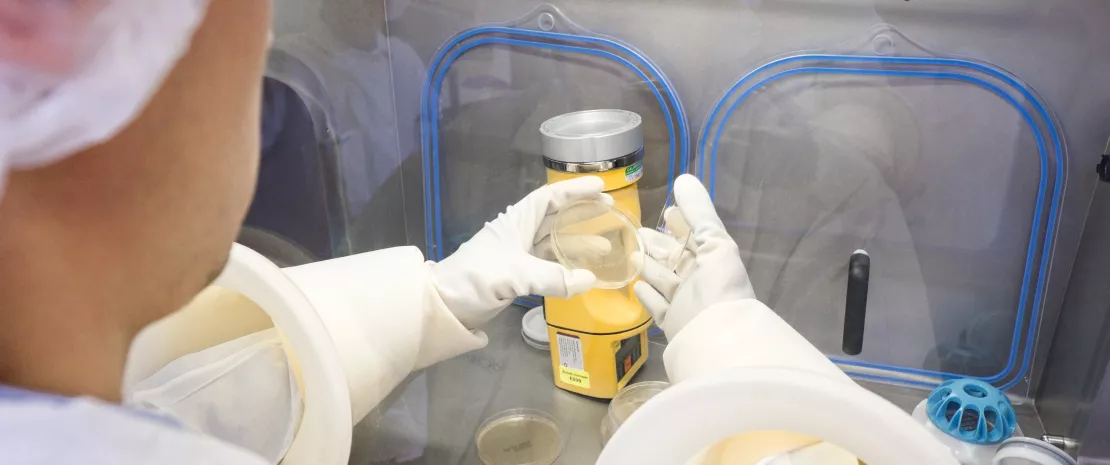Modulation of the microbiota by FMT: controversial results
Fecal transplant, targeted diets, probiotic supplementation...: although the prospects are promising, the conclusions of some publications point not only to the complexity of the subject but also to its limitations.16,17
Lay public section
Find here your dedicated section
Sources
This article is based on scientific information
Sections

About this article
The efficacy of fecal transplant in the treatment of dysbiosis seems proven, but its impact on FGIDs is more questionable.
REAL EFFICACY AGAINST DYSBIOSIS
A Danish study conducted in 2016 highlighted the efficacy of fecal transplant in cases of dysbiosis in IBS patients and revealed a significant improvement in the diversity of their gastrointestinal microbiota. The collection of fecal samples at each visit (enrolment, 1, 3 and 6 months) allowed the characterization of bacterial populations by sequencing. Analysis of the microbiota of the transplanted patients at 3 months revealed the presence of 11 species of interest. Two species displayed weak negative correlations with the IBS-SSS–or Irritable Bowel Syndrome Severity Scoring System–(both belonging to the Blautia genus which is associated with a healthy gastrointestinal microbiome) and three moderately positive (two belonging to the Bacteroides genus and one to the Ruminoccocaceae family). As of now, fecal transplant therefore appears to represent a technique for the treatment of dysbiosis in IBS patients, and potentially all FGIDs, although larger scale studies are required to define its clinical efficacy.
DIVERGENT RESULTS
The question is however raised: is fecal transplant also able to correct the pathological phenomena associated with dysbiosis? It is difficult to give a final answer regarding FGIDs, mainly because of the scarce number of randomized clinical studies. The few trials available in the scientific literature deal with IBS and do not yet allow a judgment to be made because of divergent conclusions.
IBS-SSS SCORE
Functioning
The IBS-SSS score is comprised of 5 parameters quantified on a 100-point analog scale.
The five items added together give a severity score between 0 and 500.
- 0-75 > control or patient in remission
- 75-175 > benign form
- 175-300 > moderate
- 300 and over > severe
Criteria
- Severity of abdominal pain;
- Frequency of abdominal pain;
- Severity of bloating;
- Relief after defecation;
- Interference with quality of life
PROS AND CONS
In Norway in 2015, 83 participants aged between 18 and 75 took part in a study: after an enema 2/3 of them received a fecal transplant and 1/3 a placebo (their own feces) in both cases via the colon. The reduction of symptoms at three months was evaluated using the IBS-SSS score. The difference was significantly in favor of transplant: 65% improvement against 43% for the placebo–a difference which was not confirmed at 12 months. The “loss of efficacy” could be explained by a powerful effect of the transplanted microbiota right after the administration, but a difficulty in grafting durably in its host due to the effect of exogenous and/ or endogenous factors. One year later in 2016, another study disproved the benefit of fecal transplant: after an enema, 52 patients with moderate or severe disease received a graft (orally) from healthy donors (n=26) or a placebo (n=26). The IBS-SSS score and quality of life were then evaluated. At 3 months, a significantly greater improvement in symptoms and quality of life was observed… in the placebo arm. Suggested hypotheses: the fecal transplant could counteract a positive effect of the enema; some pathogenic microorganisms could be removed by the enema then reintroduced by transplant; the duration of treatment or the quantity of re-implanted fecal bacteria might be insufficient.
16 Halkjær SI, Christensen AH, Lo BZS, et al. Faecal microbiota transplantation alters gut microbiota in patients with irritable bowel syndrome: results from a randomised, double-blind placebo-controlled study. Gut. 2018;67(12):2107-2115.
17 Johnsen PH, Hilpüsch F, Cavanagh JP, et al. Faecal microbiota transplantation versus placebo for moderate-to-severe irritable bowel syndrome: a double-blind, randomised, placebo-controlled, parallel-group, single-centre trial. Lancet Gastroenterol Hepatol. 2018;3(1):17-24.




